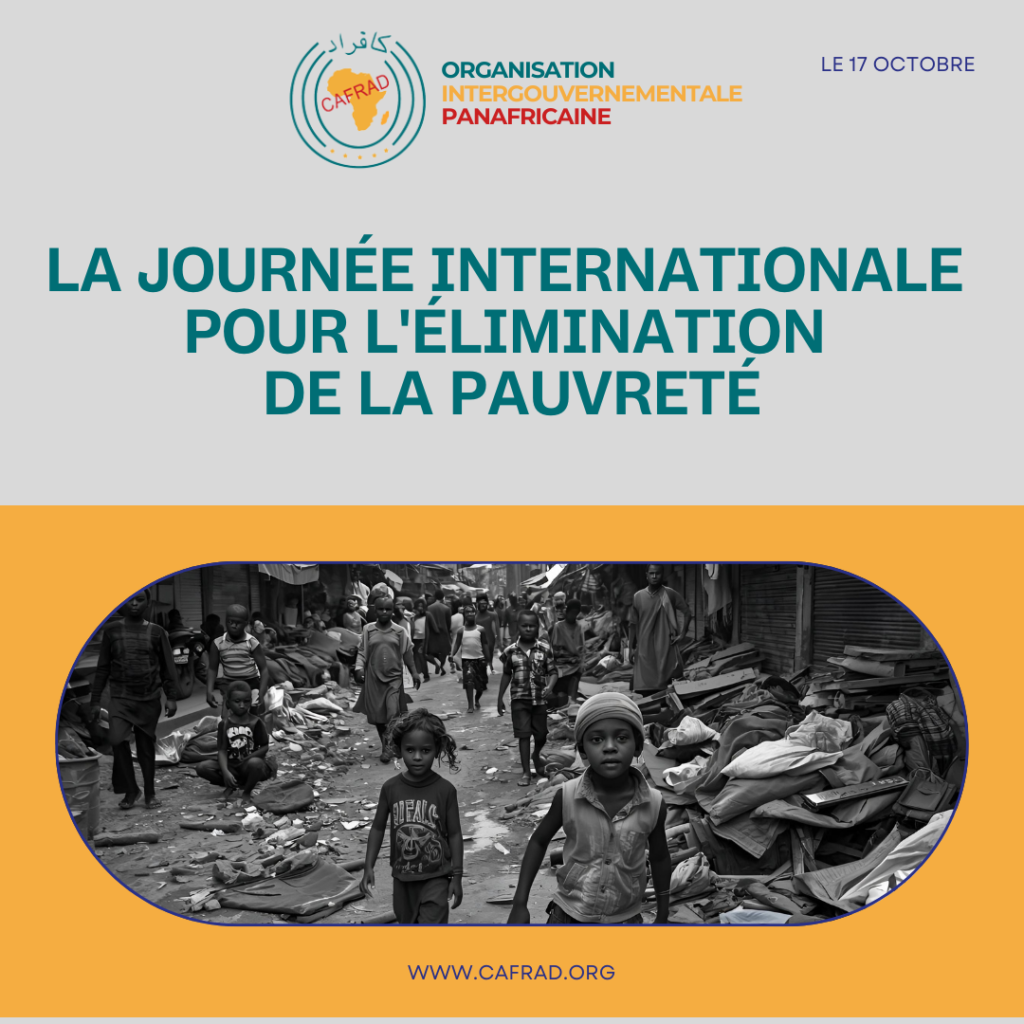International Day for the Eradication of Poverty: Africa in the Face of Hunger and Chronic Poverty

October 17 marks the International Day for the Eradication of Poverty, an opportunity to highlight the urgent need to act against poverty and food insecurity, particularly in Africa. This day sheds light on the persistent challenges facing the continent, despite the efforts made to improve the situation.
An Alarming Situation
According to the 2025 report by the Food and Agriculture Organization (FAO) of the United Nations, over 307 million people in Africa were facing hunger in 2024, representing 20.2% of the continent’s population. Malnutrition also affects a large number of individuals who lack access to adequate, nutritious, and balanced food.
If current trends continue, the number of chronically undernourished people in Africa could reach 512 million by 2030, accounting for nearly 60% of the global total of undernourished individuals.
This food crisis is exacerbated by multiple factors: prolonged conflicts, climate change, economic instability, export of natural resources without local transformation, structural governance challenges, widespread terrorism, and the lack of agricultural infrastructure. Regions such as the Sahel, Sudan, and East Africa are particularly vulnerable, with critical levels of child malnutrition.
The Role of CAFRAD
In the face of this situation, initiatives such as those led by the African Training and Research Centre in Administration for Development (CAFRAD), in partnership with international organizations like the Arab Bank for Economic Development in Africa (BADEA), play a crucial role. These organizations are working together to strengthen the capacities of African states in managing agricultural projects, with a focus on training, strategic planning, and the integration of information and communication technologies (ICTs) into agricultural systems.
Their programs aim to boost local food production, reduce reliance on imports, and promote efficient and transparent agricultural governance.
Objectives of the Training Programs
The seminars organized by these institutions pursue several key objectives:
Strengthen the institutional capacities of African countries in the management of agricultural and food security projects;
Promote the use of ICTs to improve project management and transparency;
Encourage gender inclusion, particularly by supporting the empowerment of women and youth in the agricultural sector;
Foster regional and international cooperation for a coordinated response to food security challenges.
Looking Ahead
Despite the obstacles, progress is possible. Implementing targeted strategies, investing in agricultural infrastructure, and promoting inclusive policies can significantly improve food security in Africa. The sustained commitment of governments, international organizations, and civil society is essential to achieving the Sustainable Development Goals (SDGs) related to ending poverty and hunger.
Call to Action
On this International Day for the Eradication of Poverty, it is imperative to renew our commitment to the most vulnerable populations. This requires greater support for local initiatives, stronger international coordination, and special attention to the needs of women, youth, and rural communities.
It is important to emphasize that effective implementation of the UN SDGs, the African Union’s Agenda 2063, and the African Development Bank’s (AfDB) High 5s priorities is a crucial driver in the fight against food and nutrition insecurity on the continent:
Light up and power Africa – improving access to affordable modern energy;
Feed Africa – transforming agriculture to achieve food security;
Industrialize Africa – promoting job creation through robust manufacturing sectors;
Integrate Africa – strengthening regional integration and developing value chains for a more productive and unified economy;
Improve the quality of life for the people of Africa – especially for women and youth, enabling them to realize their full potential.
Africa has undeniable strengths—vast arable lands and a large, capable workforce—yet these are often underutilized, with many young people leaving the continent in search of better opportunities.
CAFRAD’s Commitment to African Food Sovereignty
Food sovereignty in Africa is a challenge that is interconnected with broader African issues. For CAFRAD, developing a holistic approach to tackling food and nutrition insecurity is the most effective solution.
In this context, on July 15, 2025, CAFRAD organized the 16th Ministerial Forum on the Modernization of Public Administration and State Institutions, held at its headquarters, under the theme: “The Role of Leadership in Implementing Responsible Public Governance for the Pursuit of the SDGs and the Emergence of African Nations.”
This 16th edition of the Forum aimed to develop the capacities of a new generation of leaders and managers—unapologetic, ethical, authentic, clear-sighted, transformative, transformational, bold, and visionary—capable of accelerating the implementation of the African Union’s Agenda 2063, specifically Aspiration 1: A prosperous Africa based on inclusive growth and sustainable development, the UN Agenda 2030, and national programs for inclusive and sustainable development aimed at building a new Africa.
It also aimed to equip high-level African decision-makers with conceptual, strategic, and operational tools to transform their public administrations and institutions into smart administrations and to contribute more effectively to global environmental governance.




